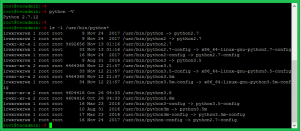

- Linux parse pdfinfo output how to#
- Linux parse pdfinfo output pdf#
- Linux parse pdfinfo output zip file#
- Linux parse pdfinfo output code#
- Linux parse pdfinfo output zip#
and if so outputs the page number Pdfpages () +

In Bash, we can use both short and long command-line. Parsing Short Command-Line Options With getopts. In this tutorial, we’ll use bash ‘s getopts function and the getopt utility for parsing the command-line options.
Linux parse pdfinfo output pdf#
Using this we can make a simple function that determines whether one or more files provided to it as an argument is a pdf or not. View pdf metadata for a file called Example.pdf: pdfinfo Example.pdf Edit existing metadata in the terminal using nano editor: pdftk Example.pdf dumpdata output Metadata-output.txt nano Metadata-output. One of the common tasks while developing a script is to parse command-line options. and pdfinfofrombytes which expose the output of the pdfinfo CLI. The -bi option gives the MIME type for a file. A python (3.6+) module that wraps pdftoppm and pdftocairo to convert PDF to a PIL. It is better to use the file utility like below file -bi test.pdf Extensions can be used but not always very reliable. The first part of the problem is to identify if the file is pdf or not.
Linux parse pdfinfo output zip#
for zip in *.You can probably come up with a complicated find and exec combination but it is best imo to keep things simple and modular.
Linux parse pdfinfo output code#
Zipinfo -1 "$zip" | grep 'pdf$'| while read pdfįinally add the code to call pdfinfo and the awk code snippet to work out the total number of pages. That's what this code does for zip in *.zip do The next step then is to get a list of the PDF files and the names of the zip files they are stored in. $ unzip -p aaa.zip "zlib 3.pdf" | pdfinfo - | grep Pagesįor this to work though, you need to know the names of the PDF files stored in the zip archive. can be used in other languages that can parse output from an external program, but I use it in PHP. $ unzip -p aaa.zip file2.pdf | pdfinfo - | grep Pages A simple command line executable called: pdfinfo.
Linux parse pdfinfo output how to#
It turns out that pdfinfo can read from stdin, so the command below shows how to get the number of pages from a pdf stored in a zip without writing anything to disk. Note that the first filename in the zip archive, "zlib 3.pdf", contains a space character. Get a virtual cloud desktop with the Linux distro that you want in less than five minutes with Shells With over 10 pre-installed distros to choose from, the worry-free installation life is here Whether you are a digital nomad or just looking for flexibility, Shells can put your Linux machine on the device that you want to use.
Linux parse pdfinfo output zip file#
This is the test zip file I'm going to use.

We can then parse this output and print it in a presentable. Listing the directories We can use the ‘ls’ command with options such as ‘-l’, ‘-al’, etc to list all the files in the current directory. Please note that when you type ‘ls > foo.txt’, shell redirects the output of the ls command to a file named foo.txt, replacing the existing contents of the file. In this first example, we will store the value of who (which shows who is logged on the system) command in the variable CURRENTUSERS user: CURRENTUSERS (who) Then we can use the variable in a sentence displayed using the echo command like so: echo -e 'The following users are logged.

View foo.txt using the cat command: cat foo.txt. Below are a few examples of using command substitution. Using these functions, we can execute Linux commands and fetch their output. For example, send output of the ls command to file named foo.txt. The code assumes that filenames ending in "pdf" are valid PDF files. The output of the executed command is stored in data. ifconfig What should be here I want the output of this command as list of inet addresses (of different access points if present). The first one we will talk about is length, which, as the name suggests, let us retrieve the length of objects, arrays and strings.The length of objects is the number of their key-value pairs the length of arrays is represented by the number of elements they contain the length of a string is the number of characters it is composed of. But I want to extract the ip alonefrom inet addr: field and list it. This code should work if any of the filenames in the zip files contain embedded whitespace. As you all know output of ifconfig is a list of lines containing inet addr: mask: etc. Here is a way to do it that doesn't write anything to the filesystem.


 0 kommentar(er)
0 kommentar(er)
